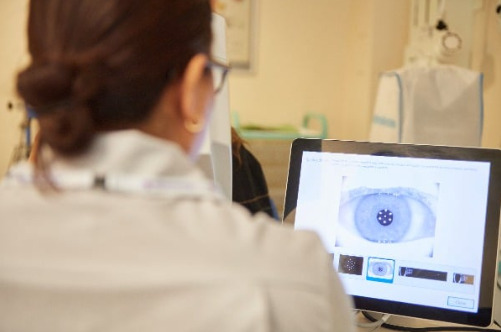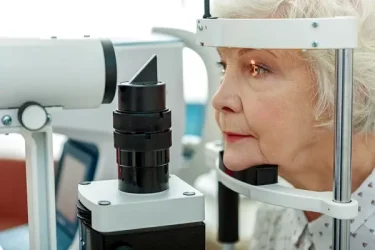We use our sight countless times every single day. We use our eyes to drive a car, see the faces of our loved ones, and enjoy TV shows and books we love so much. So, when our sight is threatened by eye problems and cataracts, it’s little wonder we want to correct it as soon as possible.
The question is: what is the waiting time for cataract surgery on the NHS? Cataract surgery is in big demand. It accounts for 6% of all surgeries completed each year, and was predicted to grow by 25% by 2027 and 50% by 2035 by the Royal College of Ophthalmologists1. Unsurprisingly, this has had an impact on cataracts NHS waiting lists.
Read on to get to grips with current expectations and explore your options for getting treated sooner.

Cataracts NHS waiting lists explained
The maximum waiting time for NHS treatments should be 18 weeks.
However, there are various horror stories circulating about the wait for eye surgery. According to an Optical Express article from 2021, some patients in Northern Ireland have been waiting for four years2. While in Devon, Cornwall and Dorset, some patients have reported a wait of 18 months.
The data from 2021 strongly indicates an increase in waiting times for NHS cataract surgery patients. The average NHS hospitals waiting time last year was around nine months, with some waiting for much longer than that. The longest waiting time in England was reported by King’s College Hospital, standing at 94 weeks (21 months). However, the shortest waiting time, at Luton & Dunstable University Hospital, was 10 weeks.
What is the NHS waiting time for cataract surgery in 2024?
NHS waiting times for cataract surgery vary depending on location. For example, the current waiting time for ophthalmology treatment at NHS Chesterfield Royal Hospital is 39 weeks (almost 10 months)3. At the NHS Dorset County Hospital, this currently stands at 45 weeks (just over 11 months)4.
How long is the NHS waiting list for cataract surgery?
It’s difficult to pinpoint exact NHS waiting list numbers. However, according to reports, half a million people received NHS cataract surgery in 20215. Along with the sharp increase in waiting times, it’s easy to conclude the waiting list is long and getting longer.
Cataract surgery waiting lists – patient priority
As waiting lists and waiting times both grow, patients become increasingly at risk of needing urgent treatment. This means that, due to the longer wait, patients are developing denser cataracts that are more difficult to treat. These complications not only severely limit a patient’s vision, but reduce their ability to enjoy life.
Another frustration to arise is that cataracts are not considered life-threatening. This means cataract surgeries are more prone to being delayed or postponed in favour of life-saving cancer surgeries.
Waiting time for private cataract surgery
Typically, the average waiting time for private cataract surgery is a few weeks after consultation. At Practice Plus Group, you will usually have cataract surgery 4-6 weeks of your booking enquiry.
Is NHS cataract surgery as good as private?
The NHS offers plenty of benefits to cataract surgery patients. Along with free healthcare, the NHS employs a range of highly-qualified specialists and boasts excellent facilities across the UK.
Explore the benefits of private cataract surgery
There are many benefits to seeking private cataract surgery at Practice Plus Group. The main ones are:
- Short waiting times – at Practice Plus Group, the waiting time for cataract surgery is just 4-6 weeks from your initial consultation
- Choose your hospital and surgeon – we have locations around the country and specialists all boasting a wealth of knowledge in their medical field. Choose one that best suits your specific needs
- Flexible finance options – finance is available over 12 months at 0% APR. Longer-term options are also available between 24-60 months at 14.9% APR.
Cataract surgery – at a glance
How to check cataract surgery waiting times
If you’ve chosen to use the NHS for your cataract surgery, you can check current waiting times local to you. This can be done via their My Planned Care site. The page is regularly updated and gives you an accurate view of how long you can expect to wait at each local hospital.
(*Practice Plus Group is not responsible for and does not control the content displayed on external websites.)
What to do when waiting for cataract surgery
While you might not be able to do much to reduce waiting times, there is some cataract guidance you can follow to manage your eyesight.
Avoiding hazards – With reduced vision, even floors and objects around your house can become trip hazards. Removing rugs and taking care around uneven surfaces can help avoid falls.
Increase the size of reading font – Instead of reading, why not try podcasts or audiobooks? Post can be made easier to read by notifying your providers to send mail with enlarged font.
TV Audio Description – If your cataracts are affecting enjoyment of your favourite TV shows, you can enable TV Audio Description. This will describe what’s happening on the screen, so you won’t miss a thing.
Avoid bright lights – If you’re struggling to read, sitting with your back to bright lights can help. Otherwise, you should use blinds and curtains to shield your eyes from bright sunshine.
Getting help – Enlisting the help of family and friends to help with every chores and activities is a great idea. However, the help doesn’t have to end there. There are various charities dedicated to eye care that can help you with advice. Maintaining a healthy diet and not smoking can also be very beneficial to keeping your eyes healthy.
How to speed up treatment for cataracts
As mentioned previously, if you’ve chosen to use the NHS for your cataract surgery, you can check current waiting times local to you via their dedicated Cataract Surgery services page. The page is regularly updated and gives you an accurate view of how long you can expect to wait at each local hospital. It can also help you to find information on how to switch waiting lists.
If you’ve chosen pay for yourself surgery with Practice Plus Group, you’ll only have to wait between 4-6 weeks from the date of your booking enquiry. Why wait longer? Learn about private cataract surgery costs.
Sources and references
1 https://www.england.nhs.uk/2023/05/new-nhs-measures-to-improve-eye-care-and-cut-waiting-times/
2 https://www.opticalexpress.co.uk/magazine/article/cataract-waiting-times
3 https://www.myplannedcare.nhs.uk/mids/chesterfield/specialty/?sname=Ophthalmology
(Practice Plus Group is not responsible for and does not control the content displayed on external websites.)
4 https://www.myplannedcare.nhs.uk/swest/dorset-county/specialty/?sname=Ophthalmology
(Practice Plus Group is not responsible for and does not control the content displayed on external websites.)
5 National Ophthalmology Database Audit

Acknowledgements
Cataract surgery waiting time FAQs
Not yet found the information you’re looking for? Our dedicated cataract surgery waiting time FAQs could help!
In England, NHS hospitals reported an 84% increase in cataract surgery waiting times from 2019 to 2021. This was caused directly by the pausing of routine procedures due to the pandemic. This has created a backlog of patients who, as has been previously mentioned, in some areas of the UK, face a wait of up to four years for surgery.
As mentioned previously, when compared to cancer and other major surgeries, cataract surgery isn’t seen as urgent. Fuelled by the coronavirus pandemic, both NHS waiting lists and times have soared. This means the conditions of many cataract patients have worsened, causing their quality of life to drop.
Cataracts are treatable regardless of the time the patient has had them. However, there are advantages to having your surgery sooner rather than later:
– short recovery time
– reduced surgery time
– decreased risk of significant visual impairments
– improved quality of life and mental health.
If left untreated, your cataracts and eye health will gradually worsen over time. Daily activities such as driving with cataracts and reading will become increasingly difficult. This could negatively affect your general quality of life. Without cataract procedures such as surgery, you will eventually experience total sight loss.
Because cataracts form over time, you will notice a gradual reduction in your vision which will start to interfere with your daily activities such as driving or reading. If left untreated, cataracts may get worse and cause severe loss of vision.
At Practice Plus Group, you’ll have your cataract surgery just 4-6 weeks after your initial consultation.






